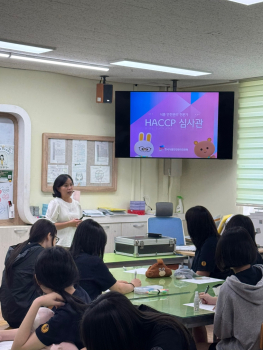메인 컨텐츠
-
- 충북여중 /
- 조회수 : 20
-
- 최정선 /
- 조회수 : 16
-
- 충북여중 /
- 조회수 : 21
| 일 | 월 | 화 | 수 | 목 | 금 | 토 |
| 1
닫기
|
2
닫기
|
3
닫기
|
4 | 5
닫기
|
||
| 6 | 7 | 8 | 9 | 10 | 11 | 12
닫기
|
| 13 | 14 | 15 | 16 | 17 | 18
닫기
|
19
닫기
|
| 20 | 21
닫기
|
22
닫기
|
23
닫기
|
24
닫기
|
25
닫기
|
26
닫기
|
| 27
닫기
|
28
닫기
|
29
닫기
|
30
닫기
|
31
닫기
|
-
-
- 흑미밥
- 메이플피칸파이 (1.2.5.6.14)
- 소고기무국 (5.6.16)
- 청경채부추무침 (13)
- 매콤닭목살구이 (2.5.6.15)
- 배추김치 (9)
- 수제흑당버블라떼 (2.13)
-
-
- 원산지
- 쇠고기(종류) : 국내산(한우) 쇠고기 식육가공품 : 국내산 돼지고기 : 국내산 돼지고기 식육가공품 : 국내산 닭고기 : 국내산 닭고기 식육가공품 : 국내산 오리고기 : 국내산 오리고기 가공품 : 국내산 쌀 : 국내산 배추 : 국내산 고춧가루 : 국내산 콩 : 국내산 낙지 : 국내산 고등어 : 국내산 갈치 : 국내산 오징어 : 국내산 꽃게 : 국내산 참조기 : 국내산 비고 :
-
- 참고사항
- 칼로리(중식):977.0 Kcal 탄수화물(g) : 117.0 단백질(g) : 38.4 지방(g) : 37.9 비타민A(R.E) : 222.7 티아민(mg) : 0.5 리보플라빈(mg) : 0.8 비타민C(mg) : 11.2 칼슘(mg) : 305.0 철분(mg) : 5.7




